In Hashimoto's disease, the same immune system you depend on to fight infection turns on you, producing antibodies that attack your thyroid gland. Here's what you have to watch for.
Know the Risk Factors
Hashimoto’s disease is an autoimmune condition, where the immune system—which normally helps fight infection and disease—instead produces antibodies that attack the thyroid gland. Why a person develops Hashimoto’s disease is still a mystery, but there are a number of factors that can contribute to your risk. “If you are female, have a family history of Hashimoto’s disease or have had another autoimmune disease, you are at a higher risk for developing the disease,” says Stephanie Lee, MD, PhD, associate chief, section of Endocrinology, Nutrition, and Diabetes at Boston Medical Center.
The condition is eight times more common in women than men, and is most often diagnosed between the ages of 40 to 60 (although teens and young women can get it too), according to the National Institute of Diabetes and Digestive and Kidney Disease. About 14 million people in the U.S. have the condition.
Here are the symptoms of Hashimoto’s disease.
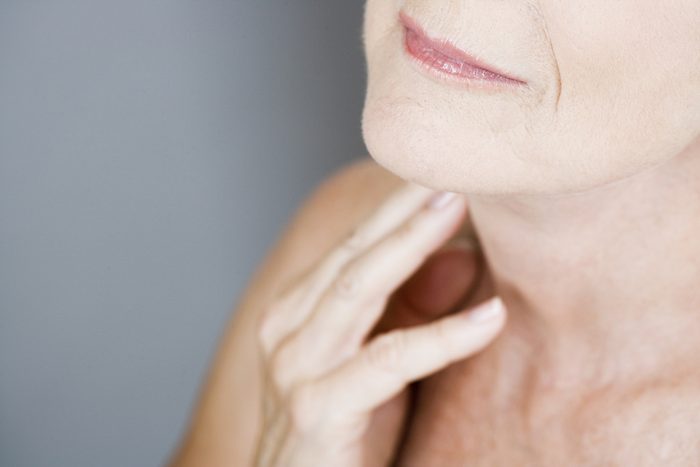 |
| AIR IMAGES/SHUTTERSTOCK |
Your Neck Is Swelling
The thyroid is a butterfly-shaped gland that’s in your neck, just south of your Adam’s apple. It produces hormones that help regulate your brain, heart, metabolism, muscles and organs. If you have Hashimoto’s disease, you can develop a goiter, which is an enlarged thyroid gland. However, goiters can be caused by other things too. The most common cause of goiter around the world is an iodine deficiency, which generally isn’t a problem in the U.S., according to the American Thyroid Association. (Goiters were more common in the U.S. before iodine was routinely added to table salt, starting about 100 years ago.) However, a goiter can also indicate that you have an autoimmune disease such as Hashimoto’s disease, which is also known as Hashimoto’s thyroiditis.
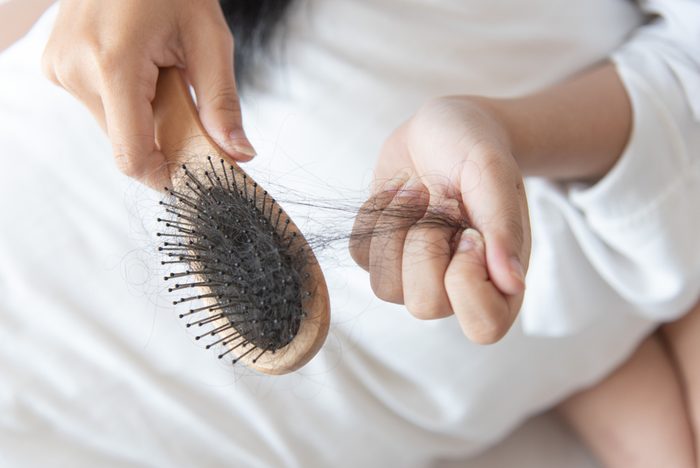 |
| PHIMSRI/SHUTTERSTOCK |
Your Hair Is Thinning
The Mayo Clinic notes that women are much more likely to develop Hashimoto’s disease, most commonly during middle age. Though losing hair volume can be a natural part of aging, thinning hair is also a symptom of the condition. Consult with your doctor if you notice abnormal hair loss or major changes in hair thickness, especially if you also have other symptoms.
 |
| ISTOCK/GEBER86 |
You’re Exhausted
“Fatigue is a very common symptom of Hashimoto’s disease,” says Dr. Lee. If your symptoms are more extreme than mere tiredness and especially if you have ruled out other possible causes of being tired—including sleep apnea, anemia or depression—you need to have your hormone levels tested.
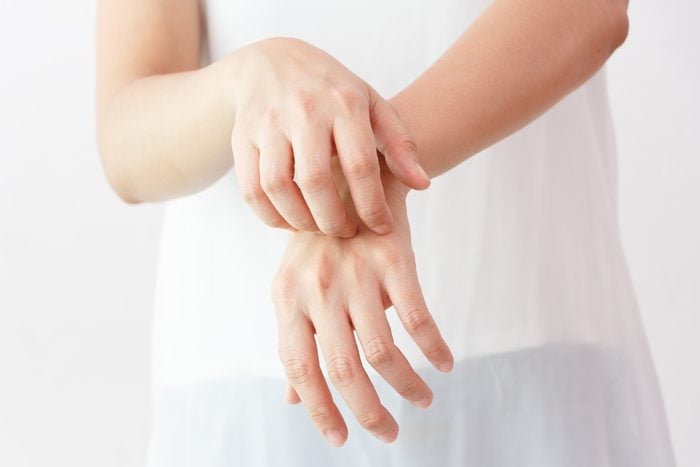 |
| NAMTIPSTUDIO/SHUTTERSTOCK |
Your Skin is Dry
As with many of Hashimoto’s disease symptoms, dry skin can be caused by a lot of conditions—eczema, psoriasis, allergies and dehydration among them. But if your skin is getting drier and you have several other symptoms on this list—or a family history of autoimmune diseases—you should talk with your doctor.
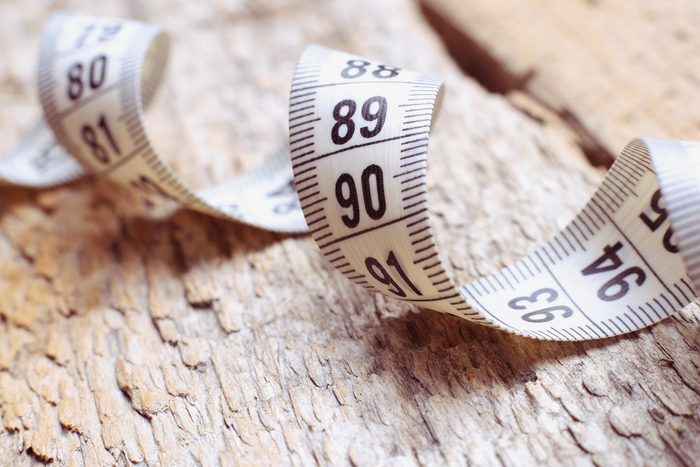 |
| COZY HOME/SHUTTERSTOCK |
You’re Gaining Weight For No Good Reason
Because your thyroid controls your metabolism, people with Hashimoto’s often experience unexpected weight gain. “Weight gain is also tied to getting older,” says Dr. Lee who notes that the condition often starts in middle age. “It is a shame not to diagnose Hashimoto’s early as the treatment is so easy,” says Dr. Lee. Working with an endocrinologist who is familiar with your specific case is a good idea as they can become familiar with your personal history and medical care.
 |
| STOCK-ASSO/SHUTTERSTOCK |
You Experience Eyelid Swelling
Again, allergies and dry eyes can lead to swelling—but, says Dr. Lee, if you have this in combo with other Hashimoto’s disease symptoms, discuss the issue with your doctor.
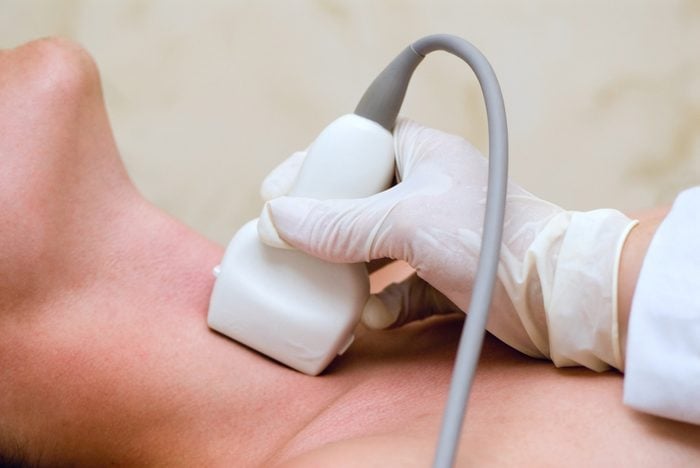 |
| BORK/SHUTTERSTOCK |
Your Thyroid Hormones Are Out Of Whack
People who have symptoms of Hashimoto’s disease will likely be screened first with a test of their thyroid-stimulating hormone (TSH) levels. “This is the primary test for hypothyroidism,” notes Elizabeth Pearce, MD, an endocrinologist at Boston Medical Center and president of the American Thyroid Association. TSH is a signal from the pituitary gland in the brain to the thyroid that says “we’re running low; make more.” When TSH is high, it can be an indicator that production is low. Most endocrinologists will do further testing on anyone with levels higher than the upper level of normal, especially in the presence of multiple symptoms. Measurement of free T4 can help differentiate between primary, secondary, and subclinical hypothyroidism.
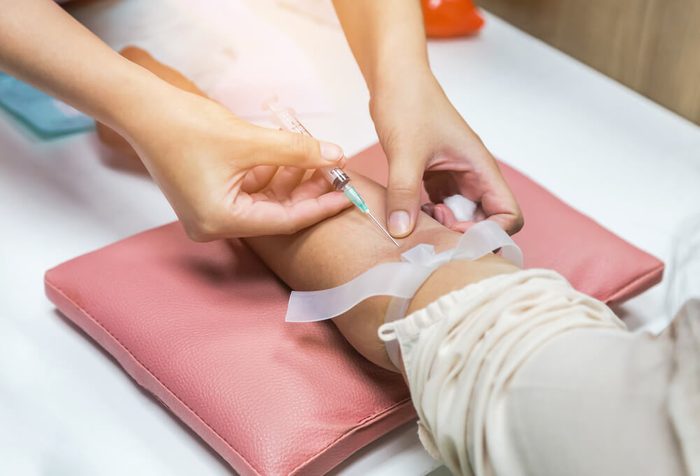 |
| SOONTHORN WONGSAITA/SHUTTERSTOCK |
Diagnosing Hashimoto’s Disease By Symptoms Alone Is Tricky
The good thing about having an early TSH screening test, says Dr. Lee, is that it allows doctors to diagnose thyroid disorders much earlier, even before you experience symptoms. “When you start seeing a constellation of symptoms, you should get screened,” says Dr. Lee. TSH blood tests can help doctors reach a diagnosis; they’ll also look for the symptoms above, along with depression, heavy periods, pale skin, increased sensitivity to cold and brain fog. Anyone with suspected Hashimoto’s disease may be given two antibody tests: anti-TPO and TgAb. Anti-TPO attacks an enzyme in the thyroid gland, called thyroid peroxidase, which is important in the production of thyroid hormones. TgAb attacks thyroglobulin, a key protein in the thyroid gland that is essential to the production of T4 and T3 thyroid hormones. It’s not essential to check these antibody tests if it won’t change management. Patients can have Hashimoto’s and not have positive antibodies and patients can have these anti-bodies but still have normal thyroid function. An endocrinologist can explain if checking these antibodies might be helpful to your case.
 |
| RIDO/SHUTTERSTOCK |
Women Who Are Pregnant Need To Pay Special Attention To Symptoms
Women who are pregnant and experiencing symptoms of Hashimoto’s disease should be especially proactive about being screened. “If you have Hashimoto’s disease and learn you are pregnant, you should call your endocrinologist,” notes Dr. Pearce. This is especially important if you are on medication since your body won’t be producing enough thyroid hormones on its own; your doctor may need to boost your dose for the healthy development of your baby.
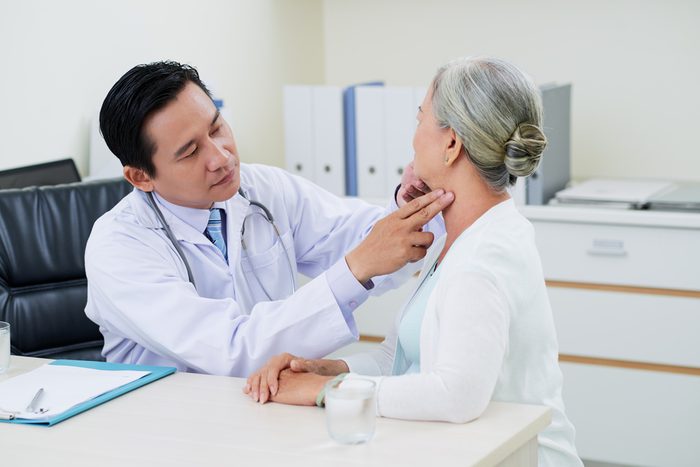 |
| DRAGON IMAGES/SHUTTERSTOCK |
There Is No Cure For Hypothyroidism, But There Is Hope
Although there is no cure for hypothyroidism, it can become more or less severe over time. You may have to take medication for the rest of your life, and you’ll need to work closely with your doctor to monitor your dosage as you alternate from hypo- and hyperthyroid states. The good news is with proper medication and monitoring your symptoms should lessen and the effects of Hashimoto’s disease improve. You can learn a lot and find support from other Hashi’s patients by joining a support group, such as Stop the Thyroid Madness.
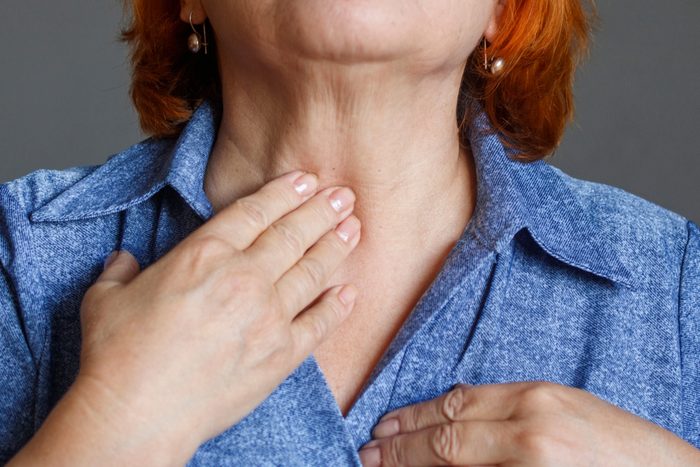 |
| ANNASHOU/SHUTTERSTOCK |
Get Educated About Hashimoto’s Disease
Dr. Pearce points out that there is an abundance of information—and misinformation—online; she suggests that people talk directly with their doctors and reference the American Thyroid Association to learn more.
Sources:
- Stephanie Lee, MD, PhD, associate chief, Section of Endocrinology, Nutrition, and Diabetes at Boston Medical Center.
- Mayo Clinic: "Hashimoto's disease"
- Elizabeth Pearce, MD, an endocrinologist at Boston Medical Center and president of the American Thyroid Association.
Important Notice: This article was also published at www.thehealthy.com by Stacey Marcus where all credits are due. Medically reviewed by Susan E. Spratt, MD
Disclaimer
The watching, interacting, and participation of any kind with anything on this page does not constitute or initiate a doctor-patient relationship with Veripeudic.com. None of the statements here have been evaluated by the Food and Drug Administration (FDA). The products of Veripeudic.com are not intended to diagnose, treat, cure, or prevent any disease. The information being provided should only be considered for education and entertainment purposes only. If you feel that anything you see or hear may be of value to you on this page or on any other medium of any kind associated with, showing, or quoting anything relating to Veripeudic.com in any way at any time, you are encouraged to and agree to consult with a licensed healthcare professional in your area to discuss it. If you feel that you’re having a healthcare emergency, seek medical attention immediately. The views expressed here are simply either the views and opinions of Veripeudic.com or others appearing and are protected under the first amendment.
Veripeudic.com promotes evidence-based natural approaches to health, which means integrating her individual scientific and clinical expertise with the best available external clinical evidence from systematic research. By individual clinical expertise, I refer to the proficiency and judgment that individual clinicians acquire through clinical experience and clinical practice.
Veripeudic.com does not make any representation or warranties with respect to the accuracy, applicability, fitness, or completeness of any multimedia content provided. Veripeudic.com does not warrant the performance, effectiveness, or applicability of any sites listed, linked, or referenced to, in, or by any multimedia content.
To be clear, the multimedia content is not intended to be a substitute for professional medical advice, diagnosis, or treatment. Always seek the advice of your physician or other qualified health providers with any questions you may have regarding a medical condition. Never disregard professional medical advice or delay in seeking it because of something you have read or seen in any website, video, image, or media of any kind. Veripeudic.com hereby disclaims any and all liability to any party for any direct, indirect, implied, punitive, special, incidental, or other consequential damages arising directly or indirectly from any use of the content, which is provided as is, and without warranties.

